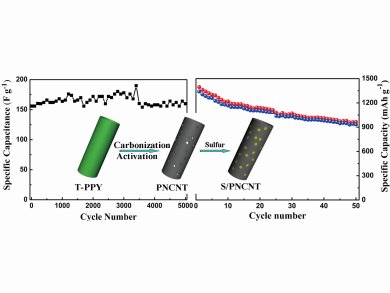With environmental concerns top of the agenda, new and more efficient methods for energy storage are ever more desirable. Lithium/sulfur batteries are one of the most promising systems for the next generation of high-energy rechargeable lithium batteries because of their high theoretical specific capacity (1675 mAh/g) and energy density (2600 Wh/kg). However, these batteries currently suffer from several drawbacks as sulfur and its fully reduced compound lithium sulfide are highly insulating materials.
Xiaogang Zhang and co-workers, Nanjing University of Aeronautics and Astronautics, China, have developed porous nitrogen-doped carbon nanotubes (PNCNTs) with a high specific capacitance of 210 F/g from a tubular polypyrrole (T-PPY). These unique tubular nanostructures with hierarchically porous carbon walls confine elemental sulfur to enhance the electric conductivity and minimize the dissolution of lithium polysulfides. This makes them promising candidates for both electrical double-layer supercapacitors and lithium/sulfur batteries.
- Porous Nitrogen-Doped Carbon Nanotubes Derived from Tubular Polypyrrole for Energy Storage Applications,
Guiyin Xu, Bing Ding, Ping Nie, Laifa Shen, Jie Wang, Xiaogang Zhang,
Chem. Eur. J. 2013.
DOI: 10.1002/chem.201301352



